Is the world becoming better?
post by invertedpassion · 2021-02-06T09:28:31.063Z · LW · GW · 7 commentsContents
How does this knowledge matter? Why do we hold distorted views? So, is the world becoming better? #1 If the world is getting better, why aren’t we happier? #2 What cost are we paying for making the world better? #3 What if the world becomes better before it becomes worse? Alright then, what does become better with time? Knowledge. None 7 comments
This is a linkpost from https://invertedpassion.com/is-the-world-becoming-better/
This essay is inspired by the book Factfulness where the key idea explored is that the world has witnessed significant progress over the last few decades, but most people are unaware of that fact because they hold distorted views.
Talking of distorted views, to get a sense of how much do you know about the world, I highly recommend taking this quiz. Hans Rosling, the author of the book, had been quizzing thousands of people across the world and most of them (including Nobel laureates) performed worse than random chance on such questions.
For example, most people overestimate the percentage of the human population living in extreme poverty (which is defined as having an income of less than $2/mo). It’s 10% (as of 2017) but even the most educated people get it wrong.
People don’t just get the latest facts wrong but they get the trend wrong as well. Many indicators such as extreme poverty, child mortality rate, babies per family have been rapidly improving across the world.
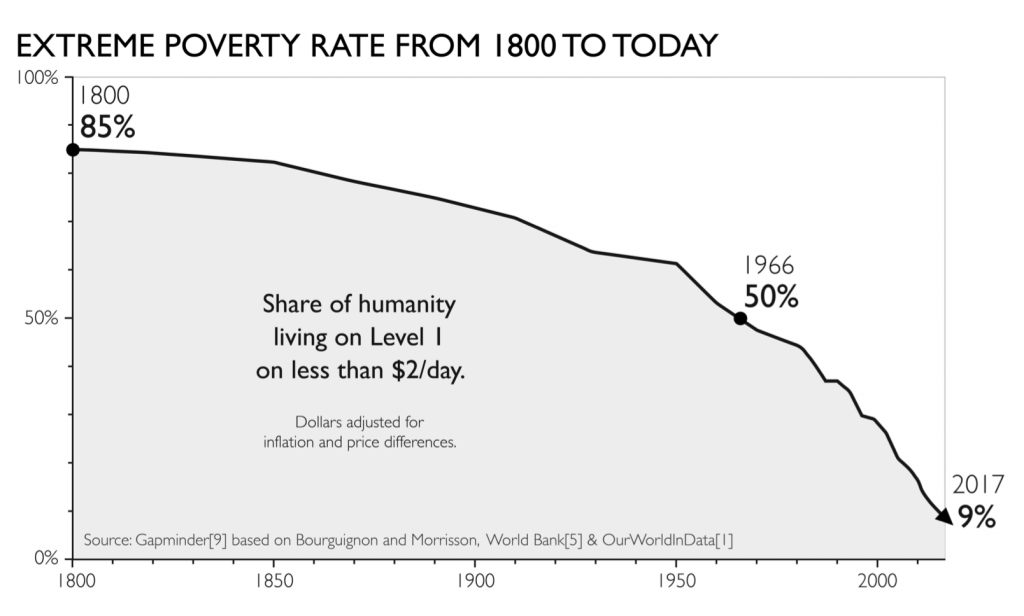
How does this knowledge matter?
Well, it matters because your decisions based on wrong facts are likely to be wrong. The knowledge that extreme poverty has not been rising but rather is rapidly falling across the world gives you an entirely different emotional and rational framework to live your life by.
One of the phrases I loved from the book is that things can be bad and better. Bad in the sense that even 10% extreme poverty is nothing to celebrate about, but better in the sense that just a few decades ago, this figure was 50%.
In other words, you can hold both these thoughts simultaneously in your head: a) billions of people have escaped extreme poverty in recent times; b) hundreds of millions of people are still living in extreme poverty.
Remember: things can be bad and better.
Why do we hold distorted views?
Believing wrong facts is mostly due to our cognitive biases, which are hard-wired into us by evolution. For example, we tend to pay a lot of attention to negative news. The ruffling in the bushes is likely just wind, but it pays to assume that it’s a tiger because in rare chance it is, your wrong belief will save your life.
This is why news also is overwhelmingly negative and attention-grabbing. No journalist would report the slow, steady but usually invisible progress such as the reduction in extreme poverty but they’d report one-off big-bang events such as airplane crashes.
Talking of airplane crashes, did you know that the deaths from airplane accidents have been rapidly falling down for decades now?
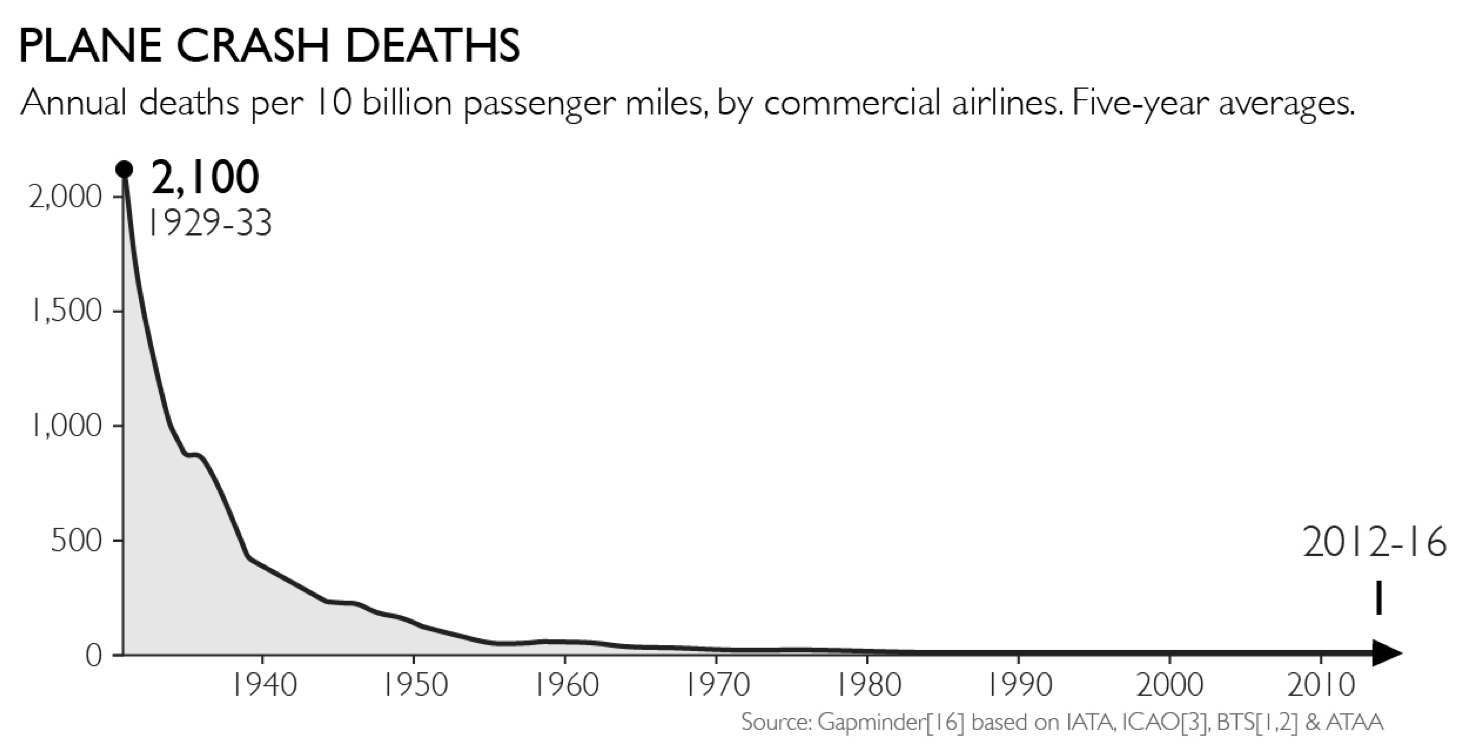
The next time you hear panic-inducing news from an airplane crash, try recalling the chart above. While even a single death in an accident is tragic, it may give you comfort knowing that accidents have become less and less frequent over time.
Remember: If airplane crashes were as common as say traffic accidents, they won’t make headlines.
So, is the world becoming better?
I’ve explored this theme of progress in several of my previous essays:
- Making peace with the ambiguity of progress
- Why are we rich but hopeless?
- What does the soul of the Marionette say?
This book helped me formalize what progress means from an individual’s point of view. The idea is pretty simple. Imagine there are two people in the world Alice and Bob. Both of them have a different amount of things available in the world. Say Bob has 1 apple and 2 units of free time, while Alice has no apples and 4 units of time.
We can say that the potential for progress exists if Alice will happily switch what she has (no apples, 4 units of time) with what Bob has (1 apple, 2 units of time) but the reverse isn’t something that Bob would want.
As a concrete example, someone living in extreme poverty with no shoes will happily upgrade to having shoes, but the reverse isn’t true (you wouldn’t replace your shoes with no shoes willingly).
Thus human desires create the potential for progress and if more humans are satisfying more of their desires, we can say that the world is getting better. Looking from this angle, the book presents a ton of data (which you can also access on their website) suggesting more people now satisfying more of their desires.
However, there are several big and important qualifications to this view of world getting better.
#1 If the world is getting better, why aren’t we happier?
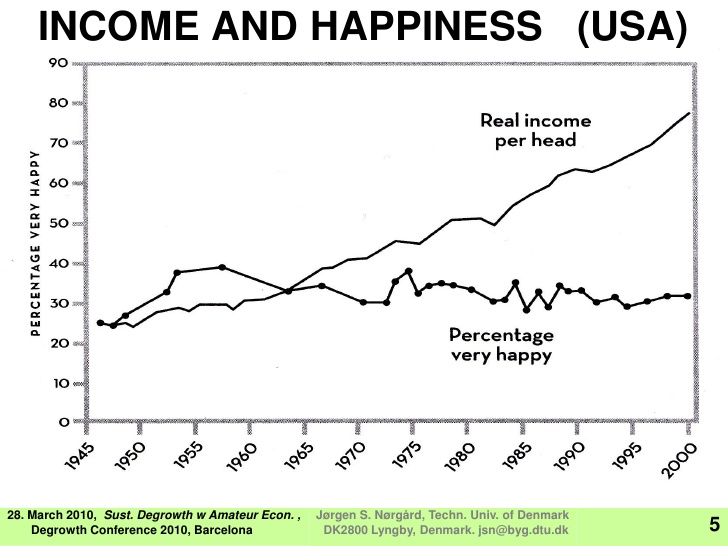
At least in rich nations, per capita income has grown and yet reported happiness levels have been more or less stable. Why is that so?
I think the conception of progress gives an answer to this riddle. While we definitely are satisfying more and more of our needs over time, our desires do not seem to have limits. For example, escaping extreme poverty is definitely progress and nobody would want to swap their situation with an extremely poor person. But it is also true that once someone has escaped poverty, there’s always someone richer that they can swap their situation with.
So, looking from an individual’s trajectory, there’s progress if an individual wouldn’t swap their present situation with their past situation. And this is the case with nations. Most of them wouldn’t prefer to go back in history when the majority of their population was living under extreme poverty.
But looking from a comparative point of view, there’s no progress because everyone else is progressing too and when you assess your happiness, you assess mostly relative to others (and not to your past self).
In short, earlier you were unhappy because you couldn’t afford a decent meal. Now, you’re unhappy because you couldn’t afford an international trip.
#2 What cost are we paying for making the world better?
Look at the charts below. Human life expectancy has increased steadily over the last century.
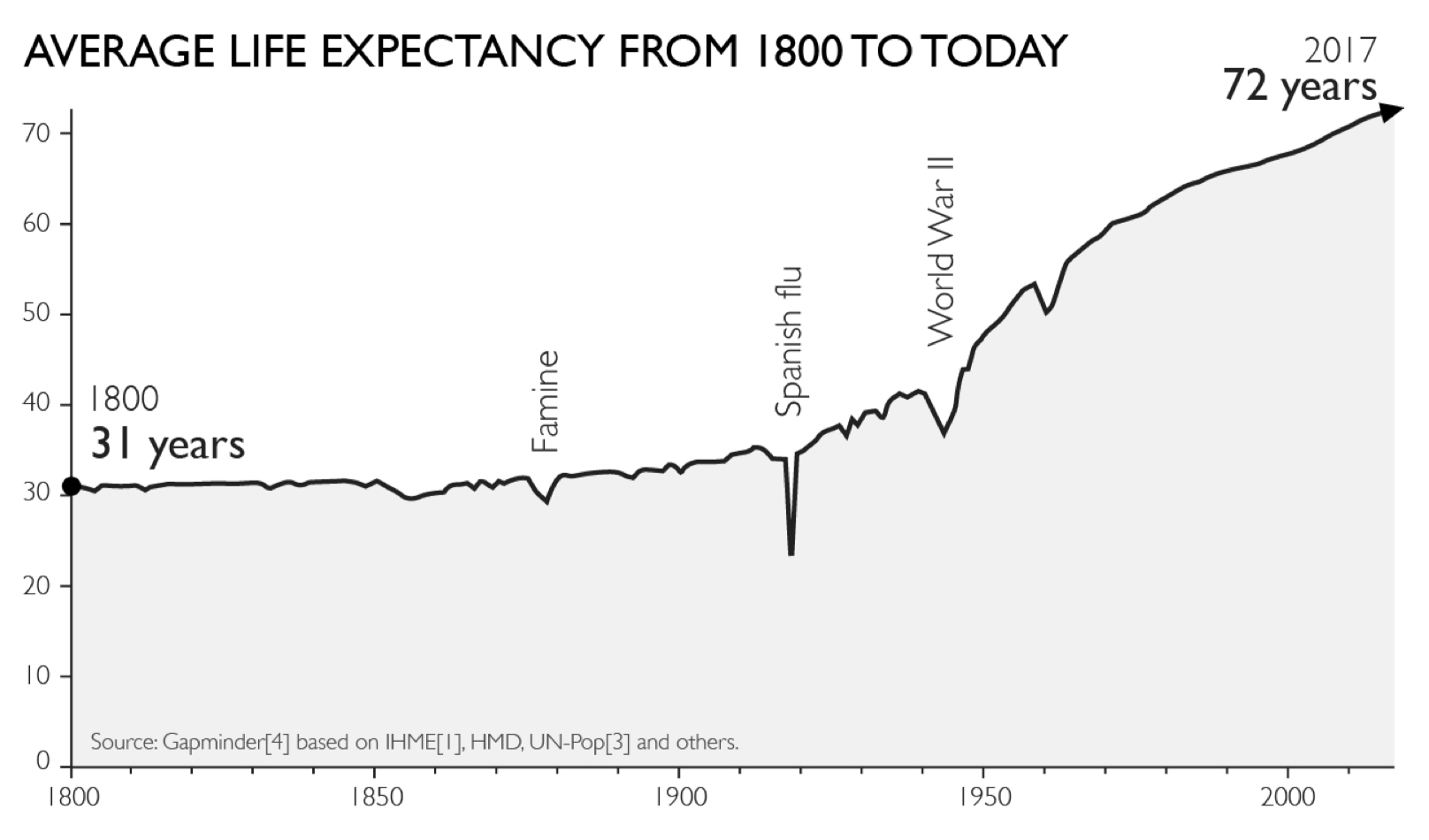
But at the same time we’ve lost 60% of wildlife in the last 50 years.
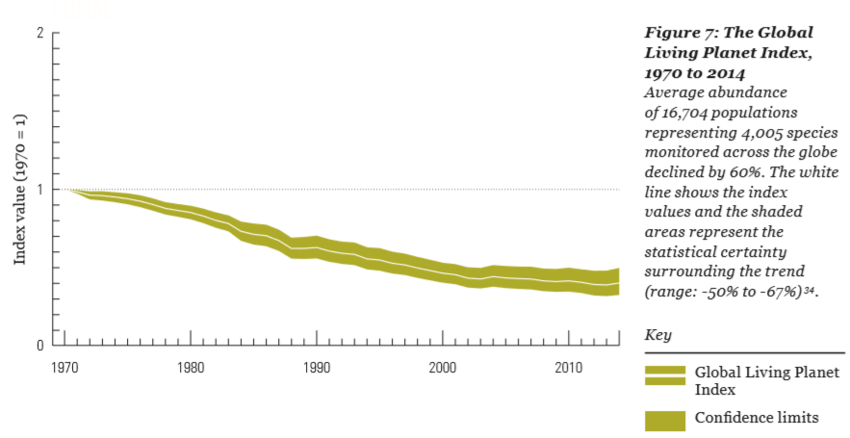
If we measure progress only from a human point of view, increased life expectancy is good news. But if we account for all living beings or all conscious beings, it seems their average life expectancy has gone down drastically. (Yes, I know we’re farming animals for meat but if such animals could speak, they’d tell you that they rather be in the wild and not dead than in captivity and waiting to be murdered).
Unfortunately, there’s no consensus on how worthy is a non-human life so doing this calculus to find out net progress comes down to individual preference.
This perhaps suggests that the answer to the question of whether the world is getting better is a philosophical one, rather than a factual one.
#3 What if the world becomes better before it becomes worse?
It’s true that the number of people dying in global conflicts and wars has been reducing ever since World War II.
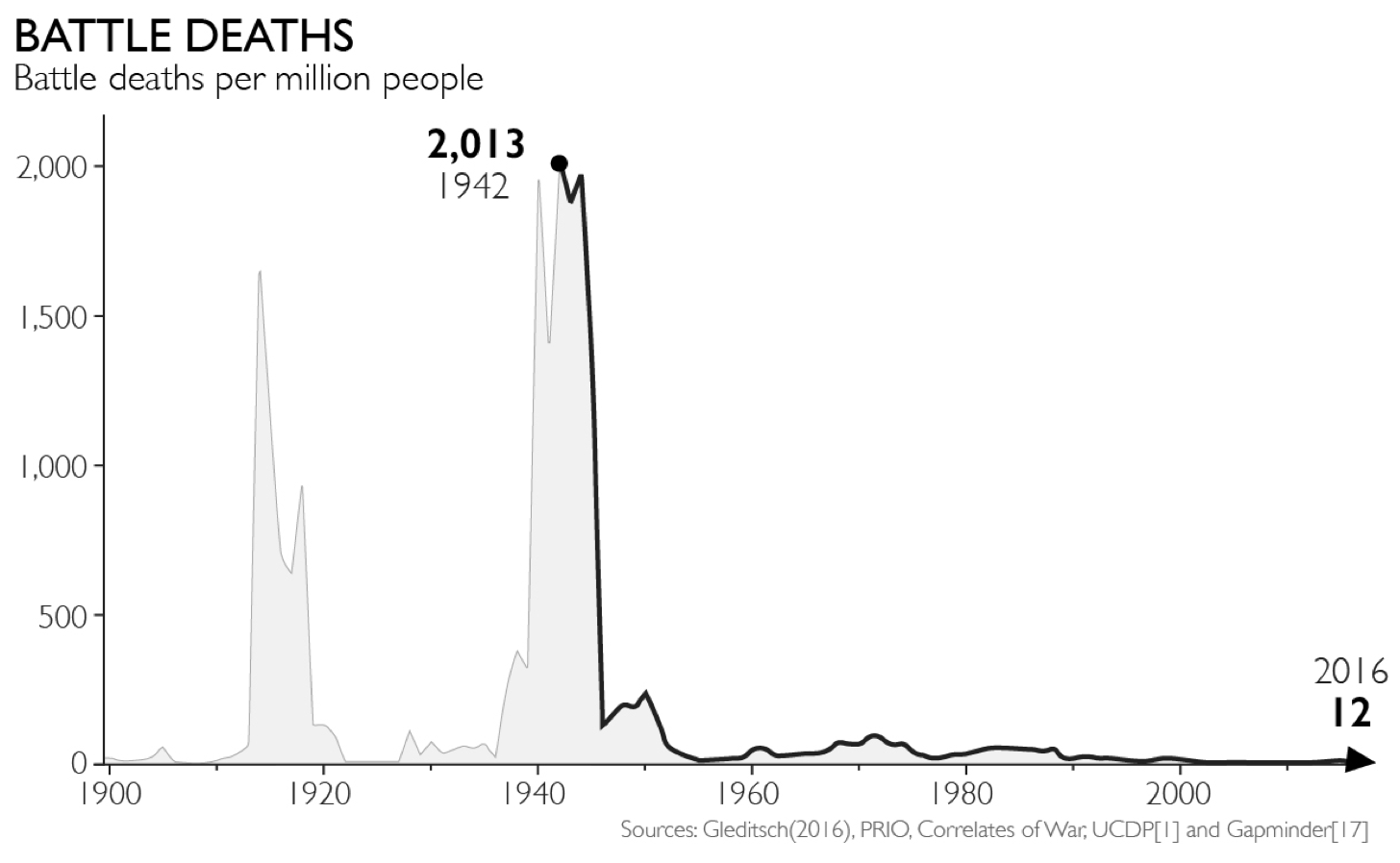
But that’s purely because we haven’t had a major war since then. There’s no guarantee that we wouldn’t have another major war in the future. What we know for sure is that we now have potentially more devastating technology than before. As technology progresses, we keep inventing new ways to kill. From deadly pathogens to fusion bombs to autonomous weapons. Today, we have it all.
Yes, the world has been relatively safe but it’s also more vulnerable for destruction than ever. Between climate change, AI, nuclear holocaust, financial collapse, pandemics, we have many potential ways to break progress trends and reset human progress.
In summary, the answer to the question “is the world becoming better” totally depends on what aspect of the world you’re referring to.
Some things are becoming better, others are becoming worse.
Alright then, what does become better with time?
Knowledge.
Even though there’s a future risk that human progress can be reset, one thing we know for sure is that knowledge once discovered remains accessible for exploitation and further compounding. In this sense, one trend in progress we can confidently assert should be our gains in knowledge.
Our knowledge that the Earth rotates around the sun and not vice versa is something that will persist. Anyone in the future who doesn’t believe that is simply going to get out-competed by the ones who believe it. Flat Earthers can believe whatever they want to believe but they won’t make profits sending satellites into space.
That’s why I feel comfort in knowing that one aspect the world has definitely gotten better at is that, as a collective, we know more than we knew before and as individuals, we have the opportunity to know more than ever before.
Today, a dedicated physics grad student can know more than Albert Einstein knew in his lifetime. That’s magical and worth celebrating!
7 comments
Comments sorted by top scores.
comment by Matt Goldenberg (mr-hire) · 2021-02-07T17:49:52.556Z · LW(p) · GW(p)
I was surprised that this post didn't talk about inequality, which is a common metric used to show the world is getting worse.
The research on happiness seems to suggest that often our life satisfaction is not based solely on standard of living, but in relative standard of living compared to our peers.
This suggests a few things:
- If everyone's standard of living raises together, it won't do much to raise happiness.
- If a few people's standards of living raise more than others, this will make people less happy on average.
- If we have more perception of people with higher standard of living than us, our happiness will go down (and if we have more perception of people with standard of living worse than us, it will go up).
comment by romeostevensit · 2021-02-07T05:26:46.854Z · LW(p) · GW(p)
People not getting happier with income has been debunked AFAIK.
Replies from: invertedpassion↑ comment by invertedpassion · 2021-02-07T13:41:16.900Z · LW(p) · GW(p)
Source?
Replies from: romeostevensit↑ comment by Daniel Tilkin (daniel-tilkin) · 2021-02-07T19:34:42.858Z · LW(p) · GW(p)
This talks about plane crash deaths, not the number of plane crashes. Under the assumption that the fatality rate of people in a crash remains unchanged, how many people are on each plane won't affect this.
comment by subjectobject (callenK) · 2022-01-12T10:39:37.993Z · LW(p) · GW(p)
That data on poverty is misleading.
For the period prior to 1981, the graph relies on estimates of GDP and income distribution from Bourguignon and Morrison.
Unlike household surveys, the B&M data does not provide information on people's access to livelihoods or provisioning, and it does not adequately capture changes in non-commodity forms of household consumption (subsistence, vegetables, fish, game, foraging, commons etc). This becomes problematic because we know that during periods of enclosure and dispossession under colonialism and early industrialization, the livelihoods and provisioning of ordinary people was often severely constrained even in cases where GDP was rising. This violent history gets obscured by the graph. (For more on this problem, see here).
this paper demonstrates that using GDP data to assess poverty causes significant distortions, and sees that the only way to determine long-term trends is to use historical consumption data.
To that end, he creates a basic necessities poverty level that is roughly similar to the World Bank's $1.90 limit, and calculates the proportion of people living below it in three main regions: U.S, U.K, India
His findings reveal a much different story than the graph above would have us believe.
There’s a final observation from Allen’s paper that’s worth pointing out. Allen finds that the $1.90/day (PPP) line is lower than the level of consumption of enslaved people in the United States in the 19th century. In other words, the poverty threshold the World Bank uses is below the level of enslavement. It is striking that anyone would accept this as a reasonable benchmark for “better” in a civilized society.
comment by Vanilla_cabs · 2021-02-07T14:51:05.271Z · LW(p) · GW(p)
If you talk about the progress of (un)happiness in rich countries over the last decades, you should say a word about the progress of unemployment in rich countries over the last decades.